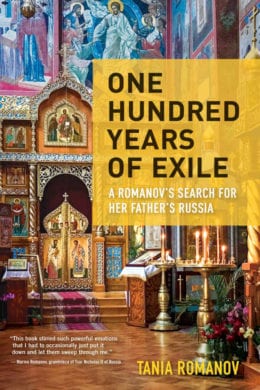 Today I welcome Tania Romanov to World Books, a blog that features interviews with authors who’ve written a story set outside of the United States.
Today I welcome Tania Romanov to World Books, a blog that features interviews with authors who’ve written a story set outside of the United States.
Tania Romanov has published One Hundred Years of Exile: A Romanov’s Search for her Father’s Russia by Travelers’ Tales which is a historic memoir set in Russia for readers interested in memoirs.
Congratulations on your recent Oct 2020 book launch!! I bought a copy and devoured it in a few readings. I’ve read over 150 books since Christmas and this one kept me engaged and turning the page. If you look like historical memoirs, One Hundred Years of Exile will not disappoint. I could not put it down!
If you don’t believe me, here are some other reviews:
“This book stirred such powerful emotions that I had to occasionally just put it down and let them sweep through me.”
—Marina Romanov, grandniece of Tsar Nicholas II of Russia
“A gripping family account, historically rigourous and ultimately moving … that couples cinematic drama with both tragedy and triumph.”
—Kirkus Reviews
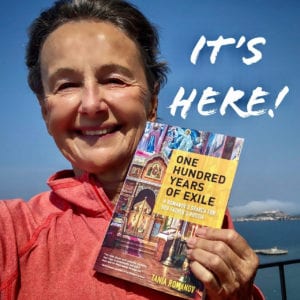 What is One Hundred Years of Exile about?
What is One Hundred Years of Exile about?
One Hundred Years of Exile is the true story of one woman’s journey through 100 years of history to find peace with her father. Tania Romanov Amochaev and her father were both exiled from their homelands as infants; both knew life in refugee camps. Their shared fate does not lead to mutual understanding.
The family’s immigration to San Francisco heralded a promising new future—but while Tania just wanted to be an American, her father could not trust that this was his final asylum. His fears and his resistance to assimilation leave Tania with deep resentment toward him and her Russian heritage. Decades later, his unexpected death exposes Tania’s open wounds and a host of unanswered questions about her father and his story.
A serendipitous meeting with a last surviving member of the Russian royal family, followed by a baffling error that miraculously connects her with unknown relatives, catapults Tania on a quest for answers in her father’s homeland.
Tania’s story proves inseparable from Russia’s, featuring Cossacks who fled revolution, a family who survived Stalin, and royal exiles, culminating in a meeting between princess and peasant. One Hundred Years of Exile is a moving story of how revisiting the past can bring not only forgiveness and redemption, but something far more powerful.
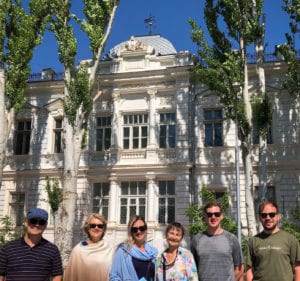
The author and her family visiting the last home (in Crimea) her grand parents stayed before leaving Russia forever.
What inspired you to write One Hundred Years of Exile?
One Hundred Years of Exile is my story of reconnecting with my father and making peace with him. I never understood his fears when I was young, but writing this book led me to reconnect with him. It was an act of atonement that has led to enormous peace for me.
How are you connected to the setting of your story?
My family was exiled from Russia in 1920, and I grew up in San Francisco. But it may as well have been in the heart of old Russia. I went to Russian school, prayed in Russian churches, was a Russian Girl Scout, and had Russians as my best friends. Meanwhile, the Soviet Union overtook Russia, and Stalin killed all memories of that old life. My traveling back to Russia, I was able to reconnect those two worlds. It was a gift I will savor for the rest of my life.
What was the biggest challenge you had writing One Hundred Years of Exile? How did you overcome it?
The biggest challenge in writing the story lay in heading back to Russia to understand the country my grandparents left. I had to go to Crimea, which the US State Department told me was extremely dangerous and should be avoided at all costs. But I couldn’t wait for our countries to resolve these challenges. November 13, 2020 was exactly 100 years after my grandparents fled Russia. In the end, I sat at the abandoned old pier where their flight on a battleship initiated. It was worth everything it took to make the trip.
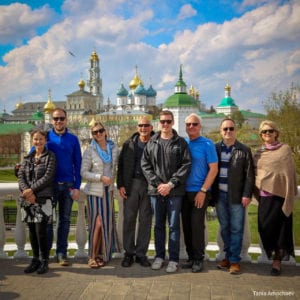
The author and her family in Russia
What kind of story can we expect next from you? Is it set outside of the United States? If so, where? And what is it about?
I travel around the world and write tales of the people I connect with. Covid is not leading to much travel, but you can read my stories in my book, Never a Stranger, by Tania Romanov. As Covid roared in, I was supposed to be trekking across northern Kenya supported by camels. It broke my heart to see that trip canceled, but I hope to take it next year, and share the tale.
Can you remember the first book set outside of the United States that made an impact on you? And why?
Black Lamb and Gray Falcon by Rebecca West, written in 1941, was a book I read as a young woman and will never forget. It was not just that she was walking through Yugoslavia, the homeland my mother had been forced to abandon, but that she reached out to local people and learned about their lives. I have been following her traces around the world since then.
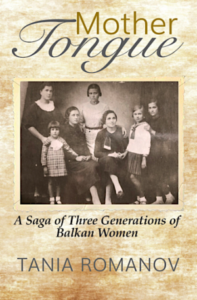 My book about my mother’s family and their forced exiles from that same land was enriched by my travel there. The book is Mother Tongue: A Saga of Three Generations of Balkan Women.
My book about my mother’s family and their forced exiles from that same land was enriched by my travel there. The book is Mother Tongue: A Saga of Three Generations of Balkan Women.
What advice would you give to aspiring writers?
Don’t wait for the right moment, write a little bit every day. Eventually, magic will appear before your eyes. Trust me.
Tania Romanov Amochaev is the author of Mother Tongue: A Saga of Three Generations of Balkan Women and Never a Stranger, a collection of travel essays. Born in the former Yugoslavia, she fled and spent her childhood in a refugee camp in Trieste, Italy, before immigrating to the United States. A graduate of San Francisco public schools, she went on to serve as CEO of three technology companies.
You can learn more about Tania and her books by checking our her website.
Thank you, Tania Romanov for joining us at World Books!
We look forward to reading more of your stories.


